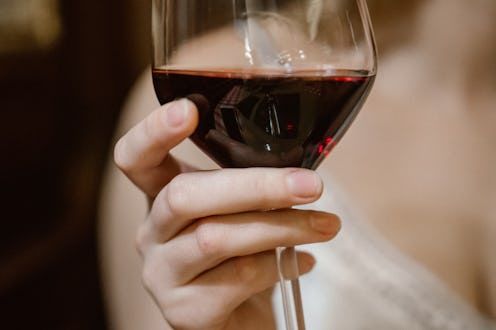Life
Is Alcohol An Anti-Depressant?

One could say that 2016 was the year we learned we were basically wrong about everything we thought we knew. First, astrologers added a 13th zodiac sign and sent our world into a tailspin. Now, a new study is calling our middle school drug and nervous system knowledge into question. You remember that lesson on stimulants and depressants? How it was basically the law that alcohol is a depressant, even though it can have stimulating effects (but that's because it depresses your inhibitions)? Well, you might as well kiss that rule goodbye: Contrary to everything we thought we knew, alcohol might be an anti-depressant, according to a new study published in Nature Communications. I don't know about you, but I'm not sure how much more new information I can handle. Just let me live in blissful ignorance!
My mini-existential crisis aside, the study worked like this: Researchers from Wake Forest Baptist Medical Center used genetically altered mice and gave them enough alcohol to get them drunk. On a related note, I would have loved to see a video of these drunk mice. But anyway, according to Munchies, the scientists "noted biochemical changes that resulted in 'non-depressive behavior' that lasted at least 24 hours." Science Daily explained that the results indicated that "alcohol produces the same neural and molecular changes as drugs that have proven to be rapidly effective antidepressants." In other words, this could be a really big deal.
The results could explain why many people with depression choose to self-medicate with alcohol — which is not my own personal theory; it's generally accepted by scientists. The study's principal investigator, Kimberly Raab-Graham, said, "Because of the high comorbidity between major depressive disorder and alcoholism there is the widely recognized self-medication hypothesis, suggesting that depressed individuals may turn to drinking as a means to treat their depression." The data from this study backs up this hypothesis and helps explain why people with depression turn to alcohol in particular — because it may have anti-depressant properties.
However, that doesn't mean we should all drink our problems away. Self-medicating with alcohol, while potentially effective, can get into dangerous territory pretty quickly. "There's a very fine line between it being helpful and harmful," Raab-Graham warns, "and at some point during repeated use self-medication turns into addiction." So self-medicating with alcohol should definitely not be a long-term solution to treating depression, and if you're suffering from depression you should seek the counsel of a professional.
These findings are especially interesting and relevant given that a recent study showed depression isn't being treated enough. As some readers were quick to point out to me, this could be due in part to the fact that mental health care is expensive, often not covered by insurance, and appointments with providers are difficult to get. I wonder if this study's findings also tie into that other study — alcohol is significantly cheaper than many mental health professionals' copays, and if it acts similarly to an anti-depressant, it might offer another explanation as to why people with depression turn to alcohol. As Raab-Graham admits, additional research is needed in this area, but hopefully by studying depression and the behaviors people with depression exhibit, we can come closer to truly understanding and curing this illness.
Images: Aliaksandra Ivanova / EyeEm/EyeEm/Getty Images; Giphy (2)